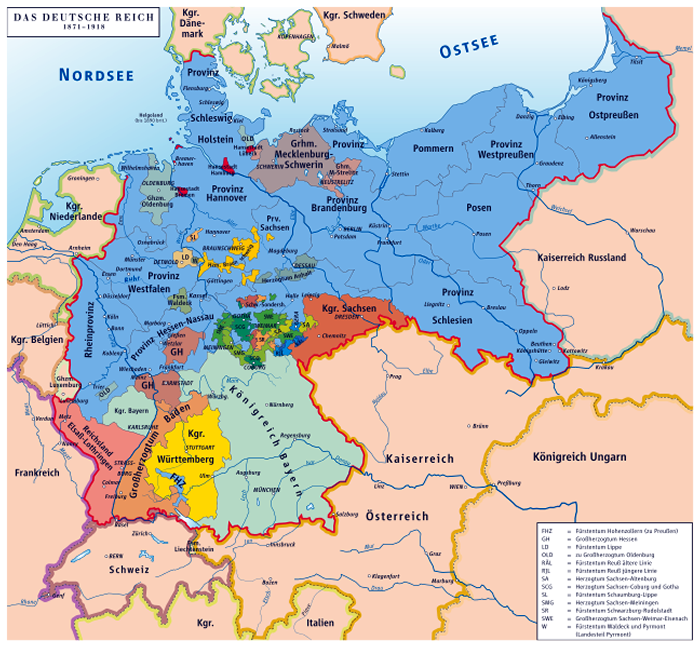 Empire of Bismarck
Empire of Bismarck

(Text by Duane R. Hurst © 2013)
Click on a link to view its information and pictures.
|
BISMARCK LINKS: Significant Event: Annex Bavaria (Neuschwanstein) Siege of Paris 1871 AD Main Cities: Berlin Time: 1871-1918 AD Language: German Personage: Kaiser Wilhelm II; Otto von Bismarck Religion: Christianity; German Religion Related Country: Germany; Poland Brief History: I have included only a few items concerning the history of this empire. A good source for more details can be found on Wikipedia or in history books. |
|
|
PRE-BISMARCK:
Numerous German principalities were components of the Holy Roman Empire (962-1806 AD). During the Thirty Years' War in 1638 AD, Berhard of Saxe-Weimar led a 8,000-man mercenary army under the pay of France reversed defeat into victory in the battle of Rheinfelden. King Frederick II (1740-1786 AD) expanded Prussian territory and modernized its army. The majority of his wars were directed at Austria-Hungary, such as the Prussian victory at Hohenfriedberg in 1745 AD. On 8 June 1815 AD, the Congress of Vienna created a German Confederation after conclusion of the Napoleonic Wars. EARLY YEARS: Otto von Bismarck, born in the province of Saxony, served as First Chancellor of Germany in 1871 AD until Emperor (aka Kaiser) Wilhelm II removed him from office in 1890 AD. Bismarck effectively ruled Prussia and united the German-speaking states into an Empire (with the exclusion of Austria). Bismarck also provoked wars with neighboring nations to achieve German unification. In 1864 AD, Bismarck launched the Second Schleswig War to reclaim German-speaking territory of Schleswig-Holstein from Denmark. A joint Austrian-Prussian army defeated the Danes in a winter Battle for Konigshugel. In April 1864 AD, Prussians crushed Danish forces in the Battle of Dybbøl. Due to Austria breaking an agreement with Prussia over Schleswig-Holstein, Bismarck ordered troops to occupy Holstein. This precipitated the Austro-Prussian War (14 June - 23 August 1866 AD). On 3 July 1866 AD, Prussia decisively defeated Austrian forces in the Battle of Königgrätz. Prussia surprised European states with its quick triumph over Austria, despite an assassin's nearly fatal attempt on Bismarck's life in Berlin at the start of the war. In 1870 AD, Bismarck sought a Franco-Prussian War (19 July 1870 - 10 May 1871 AD) to unite northern and southern German states against a common foe. His army contained the only General Staff in Europe, which directed all army operations. Prussia also had more modern weaponry than France. French forces suffered three major defeats in battle during August: 1) Wissembourg; 2) Spicheren; 3) Wörth. On 1 September 1870 AD, Prussia surrounded the French army and captured Napoleon III, who surrendered in the Battle of Sedan. France refused an armistice and Bismarck ordered a Siege of Paris, which resulted in Prussian capture of the city. On 18 January 1871 AD, Prussians proclaimed the German Empire in the Hall of Mirrors at the Palace of Versailles. Prussian troops occupied French territory until France paid war reparations. WORLD WAR I: Bismarck correctly predicted that turmoil for Germany would occur within 20 years after his death. During his rule, Germany gained various colonies such as Cameroon; Caroline Islands (modern Palau and Micronesia); German New Guinea; Marianas; Samoa; South West Africa (Namibia); Tanganyika (modern Tanzania); Togo. German activity in the Middle East, such as building the Baghdad Railway, helped cement ties between Germany and the Ottoman Empire. This further agitated British and French interests in the region and another cause that led to World War I. French and British international banks, particularly the notorious family of Rothschild, maneuvered European governments into another lucrative war for personal gain. Similar selfish elite bankrolled the earlier wars of Napoléon. On 28 June 1914 AD, a Bosnia Serb assassinated Archduke Franz Ferdinand of Austria-Hungary. Kaiser Wilhelm supported Austria-Hungary's retaliatory actions against the Kingdom of Serbia. Germany attacked France to prevent a French attempt to regain Alsace-Lorraine, which Germany seized in 1871 AD. Thus, the military followed a Schlieffen Plan by invading via Belgium and Luxembourg. Their invasion made rapid progress until halted in the First Battle of the Marne and resulted in trench warfare. Battle casualties mounted as both sides used poisonous gas and modern weaponry, including: airplanes, submarines and tanks. Battles engaged massed attacks against machine-guns, such as at Ypres and Verdun. The Eastern Front against Russia met with greater success than in France. A major reason was that Germany collaborated via Rothschild-allied international banker, Max Warburg, with other conspirators such as Jacob Schiff, J.P. Morgan, Rockefellers and British Roundtable socialists to move gold and Vladimir Lenin in a sealed train through Germany to foment the Bolshevik Revolution in Russia. Their eventual success led Russia to withdraw from the war. Stalemate on the Western Front ended when American troops flooded into the trenches. President Woodrow Wilson reneged on campaign promises and brought the United States into war against the Central Powers. They assisted in winning the Battle of the Somme. German civilians and some military units revolted against their government and the sanguinary war finally ended on 11 November 1918 AD. Allied nations, particularly Britain and France, ensured that Germany paid onerous war reparations. They also ended the Ottoman Empire. France seized modern Iraq, Lebanon and Syria. Britain grabbed Egypt and the remaining Middle East. Bulgaria, a minor Central Powers ally, lost some territory; the Austria-Hungary Empire also was dissolved, with part of its territory becoming modern Austria and Hungary. After the war, many states joined the League of Nations, but awake Americans rejected the European and international banker-sponsored organization. Nevertheless, the usual scheming elitists set the stage for a second world war by bankrolling and otherwise assisting the rise to power of Adolf Hitler in Germany. |
|
|
© Page Publisher: Duane R. Hurst
|


